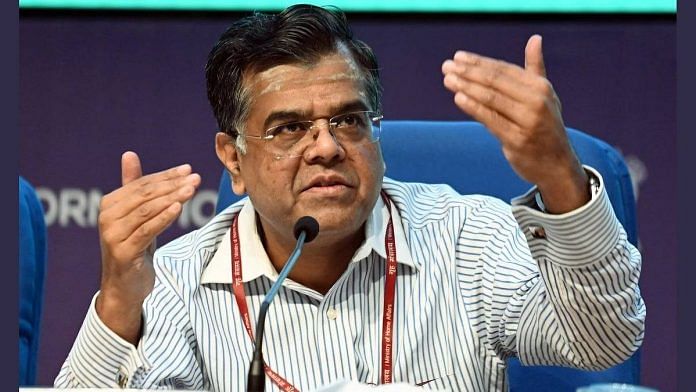New Delhi: Only the relatively rich can make full use of the exemptions provided under the old tax regime, which goes against the principle of a progressive tax regime, finance secretary T.V. Somanathan told ThePrint in an interview Thursday.
In Budget 2023 announced Wednesday, finance minister Nirmala Sitharaman made a number of changes to make the new tax regime more attractive to taxpayers. These changes included increasing the rebate limit from Rs 5 lakh to Rs 7 lakh, reducing the number of tax slabs, introducing standard deduction, and reducing the effective highest tax rate from around 42 per cent to 39.5 per cent.
A key criticism made against these moves was that the old tax regime — which allowed taxpayers to avail of exemptions, unlike the new one — was still more attractive in that taxpayers would pay less tax under it. Another criticism of the new tax regime is that, by removing exemptions, it also did away with incentives to save.
In other words, the argument goes, people were putting money in some savings instruments because this would reduce their tax burden. If there is no such incentive, they will not save.
“It (exemptions) privileges certain kinds of savings over certain other kinds of savings,” Somanathan countered. “Rather than incentivising savings as a whole, it incentivises certain kinds of saving. It therefore distorts the level playing-field between different kinds of saving.”
This assertion is backed by some research done in this area. A 2019 paper published by the National Institute of Public Finance and Policy found that tax changes indeed do not change the overall savings rate.
“The results suggest that overall financial saving is not correlated with tax announcements,” the paper said. “Financial saving has, in fact, fallen in the period (2016-17).”
The paper also looked at whether tax-paying households favoured tax-saving products to invest their savings in.
“We find that after controlling for household characteristics, the probability of investments in tax-favoured financial products is higher for households that are taxed,” the paper concluded.
The second problem with the exemptions structure was that it also incentivised what Somanathan called “dis-savings”, such as home loans, since interest paid on these loans are also exempt from tax up to a limit.
“So, my point is it is a mixed bag of saving and dis-saving, a mixed bag of privileges,” Somanathan explained.
He added: “So, at a macro level, it has not produced any great incentive for saving because of this twin nature. And at the micro level, it has distorted incentives between various savings instruments. People are getting into instruments not because they like the instrument but because there is a tax benefit.”
Also read: Govt has no role in Adani issue, it’s ‘between pvt company & regulator’: Finance secy Somanathan
‘Exemptions benefit the rich’
The finance secretary also explained that, while in theory the argument works that somebody earning Rs 7 lakh can make full use of their exemptions, this is not always the case in reality.
“There is a non-progressivity that the savings element has brought in, which is as follows — let’s say your income is Rs 7 lakh,” he explained. “It’s very difficult for you to exploit the savings opportunity because the Rs 1.5 lakh exemption amount is a lot. But the person earning Rs 15 lakh a year can easily do it.”
“So, while we claim that the direct tax structure is progressive, in effect the rates kick in very fast for the Rs 7 lakh person because his circumstances are such — he may have two children, he has some expenses — he can’t save a huge proportion of his income,” Somanathan added. “But as your income rises, you can save a large proportion of your income.”
“It (the tax exemptions) has benefited the rich,” he said. “The savings deductions benefit the rich more than the poor. The rich can exploit them fully.”
It is for these reasons, he said, that the government believes that a simple, gradually progressive tax regime with very few exemptions and distortions is in the long run better for the economy.
‘Old tax system not always better’
Sources in the government say that the argument that the old tax system with its exemptions is better for the lower-income taxpayers than the new tax system is a misreading of the situation.
“To assume that a person in the lower ends of the income tax slabs can save about 20 per cent or 25 per cent of their salary is a frivolous argument,” an official in the Ministry of Finance told ThePrint. “They can’t save this much, of course, and so the benefits that are supposed to go to them don’t go. They can’t benefit from exemptions.”
According to calculations done by the Ministry of Finance, and accessed by ThePrint, a person earning Rs 7.25 lakh a year would have to put more than a fifth of their income into a tax-saving instrument for their tax burden to be the same as it would be under the new system. In other words, if they save less than this amount, the new tax system would be more beneficial for them in terms of a lower tax burden.
In fact, the calculations show that a person earning Rs 15 lakh a year would have to invest Rs 3.75 lakh, or 25 per cent of their income, to pay the same amount of tax as they would under the new system.
(Edited by Poulomi Banerjee)
Also read: Gautam Adani news overshadowed even the Budget. The saga has just begun



